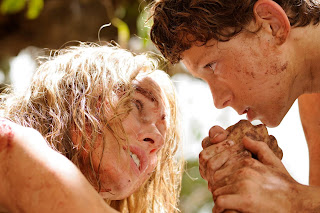So there’s been quite a gap between Anchorman and its long-awaited sequel. A decade, in fact, separate the two, yet The Legend Continues brings back pretty much all the key players and supporting cast that made the first such a widespread hit.
We’re now in the 80s. Having moved on from the Channel 4 News Team’s success of the 70s, lead anchor Ron Burgundy (Will Ferrell) and his one-time associates Brian Fantana (Paul Rudd), Champ Kind (David Koechner) and Brick Tamland (Steve Carell) have parted ways. However, when Ron is offered the chance to reassemble his crew for a graveyard news shift, then begins the journey and subsequent random adventure to bring the guys back together and to rule the news scene once more.
And so continues the utterly random, disjointed and odd comedy that proved hugely popular with the teen demographic circa 2005 — more so once it hit DVD. But for me, there’s only so many times one can hear the once quotable lines and references before it all becomes tiresome. The shelf life, especially where comedy is concerned, can, in some instances, vary in length. Take a Carry On film, for example: while they were regarded as funny 30 or 40 years ago, if one were remade it wouldn't translate well. In short, watching a Carry On today doesn't evoke the same rousing response it did. Some things don’t age well and feel stale in comparison to modern, cutting edge comedy. In contrast, The Big Lebowski turns 16 next year, yet it’s still as brilliant as ever. Anchorman’s style of humour feels more akin to the unflattering longevity of a Carry On as opposed to a Coen masterpiece. In truth, a regurgitation of Anchorman’s frivolous charm with the exact same formula doesn't work anymore.
And so continues the utterly random, disjointed and odd comedy that proved hugely popular with the teen demographic circa 2005 — more so once it hit DVD. But for me, there’s only so many times one can hear the once quotable lines and references before it all becomes tiresome. The shelf life, especially where comedy is concerned, can, in some instances, vary in length. Take a Carry On film, for example: while they were regarded as funny 30 or 40 years ago, if one were remade it wouldn't translate well. In short, watching a Carry On today doesn't evoke the same rousing response it did. Some things don’t age well and feel stale in comparison to modern, cutting edge comedy. In contrast, The Big Lebowski turns 16 next year, yet it’s still as brilliant as ever. Anchorman’s style of humour feels more akin to the unflattering longevity of a Carry On as opposed to a Coen masterpiece. In truth, a regurgitation of Anchorman’s frivolous charm with the exact same formula doesn't work anymore.
For those who wish for a light comedy to pass the time with a fond affection for the original, then there’s nothing wrong with The Legend Continues, per se. Fans will no doubt lap up the reunion of the team and have fun re-connecting after such a lengthy hiatus, but for cinema goers desiring a comedy that incorporates fresh or witty humour, I’d advise them to seek solace in something better conceived such as last year’s brilliant 21 Jump Street.
Had this come out in 2006, during the pinnacle of Anchorman’s reign, then it’d have been a warmly welcomed, funny and relevant film. As it stands, the sequel simply attempts to rehash the first’s appeal with minor tweaking or simply presenting us with the familiarity of jokes we’re believed to adore still.



























